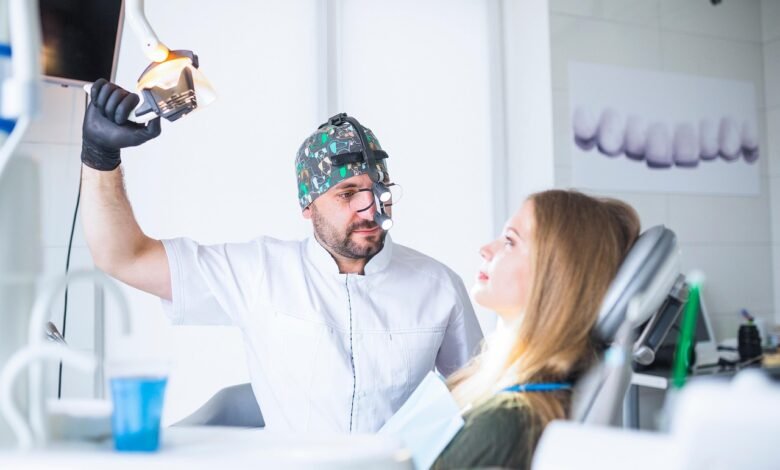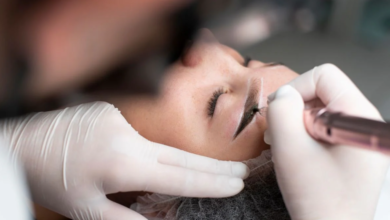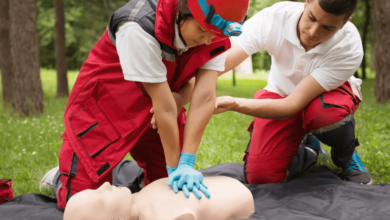Finding a Reliable Emergency Dentist in Abbotsford for Immediate Care

Understanding Dental Emergencies
Dental emergencies can be scary, and knowing what constitutes one is super important. It’s not always obvious when you need to rush to the dentist, but understanding the signs can save you a lot of pain and potential long-term issues. This section will help you identify what situations require immediate attention from an emergency dentist in Abbotsford.
Identifying Urgent Dental Conditions
So, what exactly counts as a dental emergency? It’s more than just a minor toothache. Here are some things to watch out for:
- Severe, persistent toothache: A dull ache is one thing, but sharp, throbbing pain that doesn’t go away is a red flag.
- Swelling: Swelling in your gums, face, or neck can indicate a serious infection.
- Loose or knocked-out teeth: These need immediate attention to try and save the tooth.
Recognizing Severe Pain and Bleeding
Pain and bleeding are your body’s way of telling you something is seriously wrong. Don’t ignore these signals! Here’s what to look for:
- Uncontrollable bleeding: Bleeding that doesn’t stop after applying pressure for a reasonable amount of time (like 15-20 minutes) needs immediate professional attention.
- Severe pain that interferes with daily activities: If the pain is so bad you can’t eat, sleep, or concentrate, it’s time to see a dentist ASAP.
- Pain accompanied by fever or chills: This could indicate a serious infection that needs immediate treatment.
When to Seek Immediate Care
Okay, so you’ve identified a potential emergency. Now what? Here’s a quick guide to help you decide when to seek immediate care:
- Any trauma to the face or mouth: Accidents happen, and if you’ve experienced a blow to the face, get it checked out, even if you don’t see obvious damage.
- Signs of infection: Swelling, redness, pus, fever – these are all signs of infection that need prompt treatment.
- Anything that significantly impacts your ability to eat, speak, or breathe: These are critical functions, and any dental issue that affects them requires immediate attention.
Immediate Actions for Dental Trauma
When you experience dental trauma, quick action is super important. Knowing what to do right away can seriously impact the outcome and potentially save a tooth. It’s not always easy to stay calm, but following these steps can make a big difference. This section will guide you through some common dental emergencies and the immediate actions you should take.
Managing Knocked-Out Teeth
If a tooth gets knocked out, here’s what you should do:
- First, find the tooth. Handle it carefully, and try to only touch the crown (the part you usually see). Avoid touching the root.
- Gently rinse the tooth with water if it’s dirty. Don’t scrub it or use soap.
- Try to put the tooth back in its socket. If it goes in easily, bite down gently on a soft cloth to hold it in place. If it doesn’t go in, keep it moist by placing it in milk or a special tooth-saving solution (if you have one). You can also keep it between your cheek and gum, but be careful not to swallow it.
- Get to an emergency dentist ASAP. The sooner you get there, the better the chances of saving the tooth.
Addressing Cracked Teeth
Cracked teeth can be painful and sensitive. Here’s how to handle them:
- Rinse your mouth with warm water to clean the area.
- Apply a cold compress to your face to reduce swelling.
- Take over-the-counter pain relievers if needed.
- Avoid chewing on the side of your mouth with the cracked tooth.
- See an emergency dentist as soon as possible. They can assess the damage and provide the right treatment.
Caring for Severe Tongue Bites
Biting your tongue hard can cause a lot of bleeding and pain. Here’s what to do:
- Rinse your mouth with water.
- Apply direct pressure to the wound with a clean cloth. Keep the pressure on until the bleeding stops.
- If the bleeding is heavy or doesn’t stop after a while, go to the emergency room. You might need stitches.
- After the bleeding stops, keep the area clean and avoid irritating it with spicy or acidic foods.
Finding an Emergency Dentist in Abbotsford
Finding a reliable emergency dentist in Abbotsford when you’re dealing with a sudden toothache or dental trauma can feel overwhelming. Knowing where to turn and what to do can make a huge difference in getting the care you need quickly. It’s not always easy to find someone who can see you right away, but there are options available.
Locating Nearby Emergency Dental Clinics
Okay, so first things first, how do you find an emergency dentist? Here are a few ideas:
- Google is your friend: A quick search for “emergency dentist Abbotsford” will usually bring up a list of local clinics. Pay attention to the reviews! They can give you a good sense of whether a place is reliable.
- Check with your regular dentist: Even if they can’t see you immediately, they might have recommendations for other dentists in the area who offer emergency services.
- Hospital emergency rooms: In some cases, if the dental issue is related to a more serious injury, the emergency room at the hospital might be the best place to start.
Contacting Abbotsford Dental for Urgent Care
Many dental offices in Abbotsford, like Abbotsford Dental, specifically set aside time for emergency appointments. Give them a call! Explain your situation clearly and see if they can fit you in. Don’t be afraid to call around to a few different places to see who has the soonest availability. Some clinics also offer after-hours contact options, so check their website or answering machine for instructions.
Booking an Immediate Appointment
So, you’ve found a clinic that might be able to see you. Now what? Here’s how to increase your chances of getting that immediate appointment:
- Be ready to explain your situation: The more clearly you can describe your dental problem, the better the receptionist can assess the urgency and schedule you appropriately.
- Ask about cancellation lists: Sometimes, appointments open up due to cancellations. Getting on a cancellation list can get you seen sooner.
- Be flexible with your time: If you can be available at short notice, you’re more likely to snag an appointment. Also, ask about options for dental implants in Abbotsford if that is something you need.
Services Offered by Emergency Dentists
When you’re dealing with a sudden tooth issue, knowing what an emergency dentist can do for you is super important. They’re equipped to handle a range of problems to get you out of pain and prevent further damage. Emergency dentists offer a variety of services to address immediate dental issues effectively.
Treating Lost Fillings and Abscesses
Okay, so you’ve lost a filling. It happens! Or maybe you’ve got an abscess brewing. Both can be seriously painful and need quick attention. Here’s what the dentist will likely do:
- Lost Filling: They’ll clean the area and put in a temporary filling to protect the tooth. This stops sensitivity and prevents further decay until you can get a permanent fix.
- Abscess: This is an infection, so antibiotics are often prescribed. The dentist will also drain the abscess to relieve pressure and remove the infected gunk. Root canal therapy might be needed if the infection is deep.
- Pain Relief: Expect them to manage your pain with medication or a local anesthetic during the procedure.
Reimplantation of Dislodged Teeth
Knocked-out tooth? Don’t panic! Time is of the essence, but a dentist might be able to save it. Here’s the deal:
- Handle with Care: Only hold the tooth by the crown (the part you chew with), not the root.
- Rinse Gently: If it’s dirty, rinse it with milk or saline solution. Don’t scrub!
- Replant (If Possible): Try to gently put the tooth back in its socket. If it won’t go, keep it in milk or saliva.
- See the Dentist ASAP: The sooner you get to the dentist, the better the chance of saving the tooth. They’ll splint it to the adjacent teeth to stabilize it.
Emergency Dental Implant Options
Sometimes, despite best efforts, a tooth can’t be saved. In those cases, emergency dental implants might be an option, though it’s not always immediate. Here’s the lowdown:
- Extraction: If the tooth is beyond saving, it’ll need to be removed.
- Bone Grafting (Maybe): If there’s bone loss, a bone graft might be needed to create a solid base for the implant. This adds to the healing time.
- Implant Placement: A titanium post is surgically placed into the jawbone. This acts as the new tooth root.
- Temporary Restoration: While the implant integrates with the bone (a process called osseointegration), you might get a temporary crown.
- Permanent Crown: Once the implant is stable, a permanent crown is attached, giving you a functional and natural-looking tooth.
Why Choose a Reliable Emergency Dentist
Finding a reliable emergency dentist is super important. When you’re dealing with a sudden toothache or a knocked-out tooth, you want someone who knows what they’re doing and can help fast. That’s where a good emergency dentist comes in. Let’s talk about why picking the right one matters.
Benefits of Prompt Dental Intervention
Getting to an emergency dentist quickly can make a huge difference. Seriously, it can:
- Stop the pain: Emergency dentists are pros at figuring out what’s causing your pain and getting rid of it, like, ASAP.
- Save your tooth: If you get to a dentist fast enough after a tooth gets knocked out, they might be able to put it back in. That’s pretty cool.
- Prevent infections: Ignoring a dental problem can lead to some nasty infections. Emergency dentists can stop that from happening.
Preventing Further Complications
Think of it this way: a small dental problem can turn into a big one if you don’t take care of it. A reliable emergency dentist can:
- Fix small cracks before they become big breaks.
- Treat infections before they spread.
- Stop a simple cavity from turning into a root canal.
Ensuring Long-Term Oral Health
It’s not just about fixing the immediate problem; it’s about keeping your mouth healthy down the road. A good emergency dentist will:
- Give you advice on how to take care of your teeth after the emergency.
- Help you figure out what caused the problem in the first place so you can prevent it from happening again.
- Make sure your teeth and gums are in good shape overall.
Abbotsford Dental Clinic Availability
Knowing when you can reach an emergency dentist is super important. You don’t want to be stuck with a toothache at 2 AM and have nowhere to turn! This section will cover the availability of Abbotsford Dental clinics, so you know when and how to get help.
Operating Hours for Emergency Services
Most dental clinics have regular business hours, but what about emergencies? It’s good to know if your local Abbotsford clinic offers extended hours or has a dedicated emergency service. Some things to consider:
- Do they have specific hours set aside for emergency appointments?
- Is there an on-call dentist available after hours?
- What’s the best way to contact them outside of normal business hours?
Weekend and Evening Appointments
Dental emergencies don’t always happen during the 9-to-5 workday. Weekend and evening appointments can be a lifesaver. Here’s what to look for:
- Does the clinic offer Saturday or Sunday appointments?
- Are evening appointments available, and until what time?
- Is there an extra charge for weekend or after-hours care?
Contacting for Urgent Dental Needs
When you’re in pain, you need to know how to get in touch with the dental clinic quickly. Make sure you have this information handy:
- What’s the best phone number to call for emergencies?
- Do they have an online booking system for urgent appointments?
- Is there a way to send them a message or photo of the problem before you come in?
Preparing for Your Emergency Visit
So, you’ve found a reliable emergency dentist in Abbotsford – that’s great! But what happens next? Getting ready for your appointment can make the whole experience smoother. It’s not just about showing up; it’s about being prepared to help your dentist give you the best possible care. Here’s what you should keep in mind:
What to Bring to Your Appointment
Okay, so you’re heading to the dentist. What should you bring? Here’s a quick rundown:
- Insurance Information: Have your dental insurance card handy. It speeds things up a lot.
- Medical History: A list of any medications you’re taking, allergies, and any relevant medical conditions. This is super important because some medications can affect the dental treatment you receive.
- List of Questions: Jot down any questions you have. It’s easy to forget when you’re stressed or in pain. Don’t be shy about asking anything that’s on your mind.
Understanding Treatment Expectations
Going in blind can be scary, so here’s a bit about what to expect:
- Assessment: The dentist will examine the problem area, probably take X-rays, and figure out what’s going on.
- Treatment Plan: They’ll explain the treatment options, costs, and what to expect during and after the procedure. Make sure you understand everything before agreeing to anything.
- Pain Management: Don’t hesitate to discuss pain management options. They can use local anesthesia or other methods to keep you comfortable.
Post-Emergency Care Instructions
After the emergency treatment, you’ll need to take care of yourself. Here’s what to keep in mind:
- Follow Instructions: Stick to the dentist’s instructions for medication, diet, and oral hygiene. This is key to a smooth recovery.
- Watch for Complications: Keep an eye out for signs of infection, like increased pain, swelling, or fever. If anything seems off, call the dentist right away.
- Schedule Follow-Up: Make sure to book a follow-up appointment to check on your progress and address any remaining issues. This helps prevent future problems.




